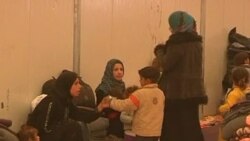ZAATARI REFUGEE CAMP, JORDAN —
U.S. Secretary of State John Kerry says the international community must push to end Syria's civil war to stop the violence and allow for the return of nearly two-million refugees. Kerry visited a refugee camp in Jordan near the Syrian border Thursday.
Secretary Kerry and Jordanian Foreign Minister Nasser Judeh came to the Zaatari camp, where nearly 120,000 people are living in what has become a small city scraped out of a dry plain 12 kilometers from the Syrian border.
Refugees and aid workers say the mindset here has changed with recent military gains by forces loyal to Syrian President Bashar al-Assad as people realize that more than two years into this war, being a refugee is not a temporary status.
Families are beginning to cement their compounds around ornamental fountains. More than a dozen babies are born each day at a Moroccan hospital in the camp. Taxis ply a main paved road known as the Champs Elysees, past some of the more than 3,000 shops and more than 500 food stalls in the camp.
But for all the effort to build a sense of normalcy here, Kerry says there is "a searing, unforgettable passion" to which the world must respond.
"It underscores the urgency of the international community one, helping to take care of these people and relieve the burden. But two, helping to bring an end to this crisis in Syria. The stories are obviously horrendous. The life is very, very difficult. The burdens on Jordan are huge," he said.
Foreign Minister Judeh says Jordan needs more help from the international community.
"But at the end of the day this is all the humanitarian spillover of a political and military crisis that's taking place on Syrian soil just 10 miles away from here. And I think the end result is a political solution that will end the bloodshed and ensure that these people go back and resume their livelihood," he said.
At $1,000,000 a day, the international community is spending big here, but refugees want more. They say donors need to supply better weapons to the Syrian opposition to help topple President Assad.
In a private meeting with refugees, one woman told Kerry, "I think the U.S. as a superpower can change the equation in Syria in 30 minutes after you return to Washington." Another refugee complained that Iran, Hezbollah, and Russia are giving far more support to President Assad than the international community is giving to the rebellion.
Kerry said the United States is doing everything it can "to help Syrians be able to fight for Syria." But he could not say what that support would be or when it might be delivered, much to the dissatisfaction of Syrian refugees.
"They are frustrated and angry at the world for not stepping in and helping. And I explained to them I do not think it is as cut and dried and simple as some of them look at it. But if I were in their shoes, I would be looking for help from wherever I could find it," he said.
Acknowledging divisions within the Syrian opposition, another refugee told Kerry those divisions are no excuse for inaction. "The international community can decide to keep its eyes closed as long as it wants," the refugee said. "We will return to Syria and we will remember everything."






